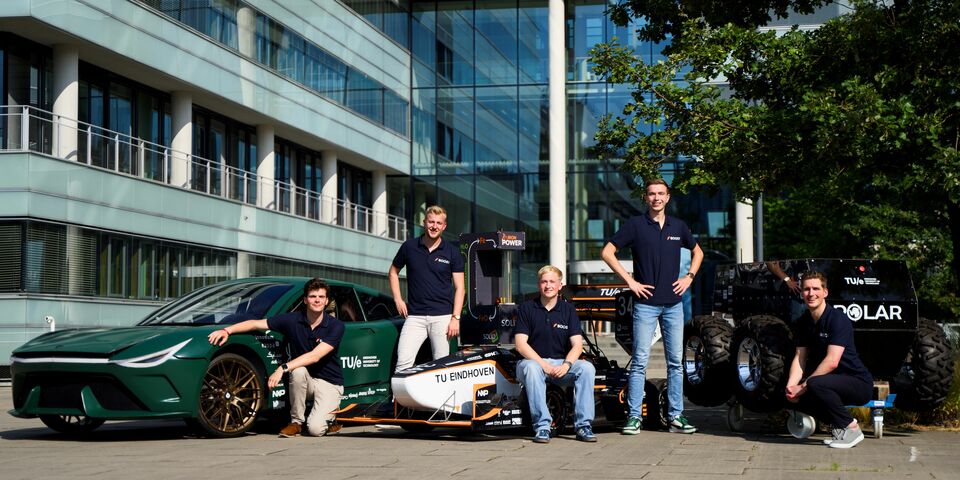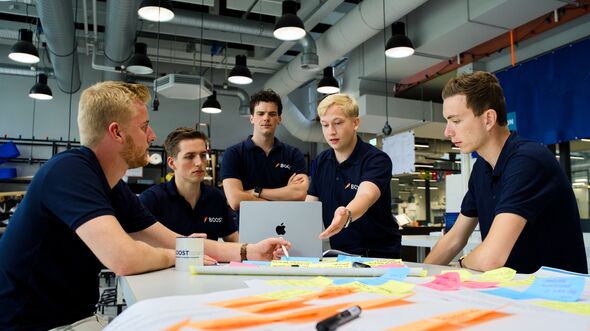TU/e students launch first Dutch fund for student teams
Today, five former members of TU/e student teams are launching a subsidy fund of 2.8 million euros for student teams throughout the province of Noord-Brabant. The fund is backed by the provincial government and is intended for all students ranging from vocational to academic education. They can apply for funding to set up a team or finance a project of an existing team. The goal is to strengthen collaborations and exchanges between institutions.
It’s an initiative by five TU/e student team alumni and their new organization BOOST, which stands for Brabantse Ondersteunende Organisatie Studententeams (Brabant Supporting Organization Student Teams). There are two types of support: an Innovation Grant up to 40,000 euros for large projects and a Kickstarter Grant up to 1,500 euros for small initiatives and for setting up a new team. Alongside the financial support, there’s also an online platform featuring information, events, news, and job opportunities.
BOOST is partnering with the following ten education institutions in Noord-Brabant: TU/e, Tilburg University, HAS Green Academy, Breda University of Applied Sciences, Avans University of Applied Sciences, Fontys University of Applied Sciences, Summa College, SintLucas, Design Academy Eindhoven, and Ter Aa.
Not just for TU/e
The provincial government earmarked a total of 1.6 million euros for the grants, over a period of five years. An extra 0.7 million euros will be made available if there are enough applications in the first two years. In a press release on the launch, provincial administrator Martijn van Gruijthuijsen says that education institutions are a ‘nursery of talent’. 'We can really use the brainpower and bravado that students bring to the table. As the provincial government, we’re happy to give this an extra push. I can’t wait to see what great ideas our Brabant talent will come up with.'
Cofounder Nick Hol spent two years setting up the fund, initially commissioned by the university. “After several talks with stakeholders, we soon realized it shouldn’t be just for TU/e, but something independent that all of the education institutions can make use of, with the ultimate goal of giving all students in Brabant the opportunity to set up their own student team or join an existing one.”
Future plans
The investment by the provincial government will be used to further expand the organization, because the fund is just one of the five elements needed to achieve a large Noord-Brabant student team ecosystem. Another one, according to Hol, is the development of shared cars, which teams can use if they want to go to a lecture or conference, for example. And there will also be a knowledge base that can help teams professionalize.
Hol's vision for the future is to further expand this broad structural collaboration between education institutions, for example by realizing housing for the teams. To this end, BOOST aims to establish a covenant with the ten participating institutions.
Student teams then become the great equalizer between educational levels, where all kinds of skills are appreciated
The great equalizer
Madis Talmar, who coordinates the student teams, asked Hol to set up the fund at the time from innovation Space. He saw how it started as an idea for a kind of ‘student team friends club’ with five large companies in the region and how it then grew into a plan for education institutions throughout the province. “This program really serves to strengthen cooperation with other education institutions in the region, such as those for secondary and higher vocational education. Student teams then become the great equalizer between educational levels, where all kinds of skills are appreciated.”
This means exciting times are up ahead. Talmar is curious about what the teams will come up with. “We are shifting to a new gear. You need a strong motivation and a strong team to first apply successfully and then complete the project.” He emphasizes that BOOST has every confidence in the student teams. “We want them to have access to advice and other resources, but the initiative lies with the students themselves. By sharing knowledge, more students can take the lead.”
Diversity
For Vedarth Mital of team HART, the BOOST fund and the associated platform have come at the right time. The team is working to improve the human experience through technology, but buying equipment for brain measurements is difficult. “That alone costs 12,000 to 15,000 euros. This grant can help us make our own products faster and more efficiently.”
In addition, it provides the opportunity for the team to get out more and increase its visibility. He also hopes to welcome students from other programs and institutions. “We can easily fill our technical positions with TU/e students, but for marketing and finance it’s always a search for the right people. We hope that a more diverse recruitment process will ultimately lead to a more diverse team.”
New talents are popping up and, more importantly, the same goes for new ideas. That can really help move things forward
New ideas
Egor Larionov of team Totem Game Dev is excited about the new platform and the subsidies. He is especially looking forward to doing more with the team, from organizing more guest lectures to setting up new projects and financing existing ones.
The team can’t wait to welcome students from other institutions. “We have a lot of programmers at TU/e, but we’re also looking for students who can create stories and design art and sounds. New talents are popping up and, more importantly, the same goes for new ideas. That can really help move things forward.”



Discussion